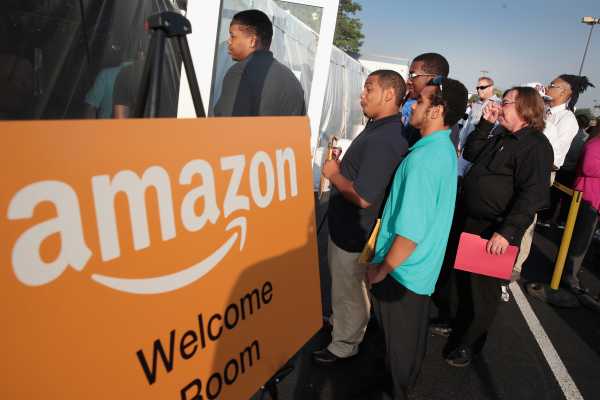
We know one thing for sure: Amazon, JPMorgan Chase, and Warren Buffett are teaming up to do something about their workers’ health care.
Other than that, we don’t know much.
The three business titans sent shockwaves through one-sixth of the American economy when they announced a new health care initiative. Despite the venture’s stunning lack of detail and the companies’ apparent short-term focus on their own workforce only, stocks for pharmacy-benefit managers and health insurers fell.
But even with all the fuss, we don’t really know yet what Amazon and its partners are actually planning to do.
“My question: What is it?” Austin Frakt, a leading health economist at Boston University, told me when I asked if he had any questions about the news. “I can’t ask any useful questions without knowing that.”
Well, okay then. Let’s start there.
No, seriously, what is this Amazon health care thing?
Amazon, JPMorgan Chase and Buffet’s enterprise Berkshire Hathaway said next to nothing Tuesday about what their partnership would specifically do. They said they would be “partnering on ways to address healthcare for their U.S. employees, with the aim of improving employee satisfaction and reducing costs.”
That’s as detailed as things got. From their joint statement:
So the companies are going to use their technical expertise — particularly Amazon’s, one assumes — to try to deliver cheaper health care to their workers. That’s about all we know for certain. That might be all they know for certain. As the Wall Street Journal reported:
What could they be doing?
There are a few different ways to read the announcement. The one thing most of the experts I asked agreed on is that the companies are going to be funding their own health insurance. A lot of big companies do that, which is called becoming “self-insured.” The difference could be if they take all the administrative responsibility of running a health plan, rather than contract it out to a third party.
“My guess is they are going to become a self-insured plan for their employees,” Caroline Pearson, senior vice president at Avalere, said, “but instead of contract out all the benefit management services, they will use it as an incubator to test new models for payment and care delivery.”
So apps, sort of. A better digital infrastructure for their health care interface sounds like a big part of it, helping these companies or their workers navigate their insurance benefits and their health care itself.
If you took an expansive reading of the statement, you could wonder if the companies are also planning to take over the health care part of the office too. Create a miniature socialist paradise by having the same entity that pays for health care own the doctors and the hospitals that provide it. Sen. Bernie Sanders (I-VT) certainly thought so.
Craig Garthwaite, a conservative health economist at Northwestern University, gave me one big reason to doubt the companies would go too far in that direction: Scale. Amazon has 500,000 workers, but they are spread out. Even the 40,000 workers in Seattle might not be a big enough population to sustain their own health care system.
“It’s not gonna be enough to disrupt all of health care and have a hospital for Amazon employees,” Garthwaite said.
The most likely iteration of the Amazon venture seems like a health care experience built on better apps and digital infrastructure, but one built in-house instead of hiring outside contractors to do it.
So is this going to work?
The possibilities do seem endless, though, with the venture fresh off its announcement and lacking enough details to invite real scrutiny.
“What’s potentially interesting here is who these companies are. This could represent a potent combination of technological know-how, a massive online sales presence, and investment expertise aimed at health care,” said Larry Levitt, senior vice president at Kaiser Family Foundation. “Are they going after insurers? Hospitals? Drug companies? All of the above? I guess we’ll find out.”
The best measuring stick could be how many pieces of the traditional health plan infrastructure the companies manage to replace with their own. The more the companies chip away at third-party administrators, pharmacy benefits managers and the like, the more disruptive they could be.
“It will be interesting to see how many of their services they ‘build’ vs ‘buy,’” Pearson said. “The more pieces of the ‘traditional’ self-insured health care model that they can pick off and remake, the more likely they are to be disruptive.”
The most ambitious version of this, though, is that sketched out by Ben Thompson at the Stratechery: Amazon builds a successful interface and then starts to market it to other large employers, becoming as ubiquitous in meditating the lucrative health care administration business as it is in retail.
But even so, how much value is to be gained from more administrative efficiency, experts wondered. There isn’t ample evidence from previous efforts that it can move the needle much. A better electronic health record isn’t going knock one percentage point off health care’s share of our collective GDP, as Garthwaite quipped.
“The [health care] savings that have existed to date have not come from better care coordination,” he said.
Amazon and its partners are going to need to succeed where others have failed if they are limiting their pursuits to administering health care more efficiently or a technology platform that gives their workers more control over their health care.
“There are a ton of apps targeting employee behavior, cost control, and wellness. By and large, they don’t work,” Pearson said. “Can Amazon create a technology platform that is compelling enough and integrated enough into workers daily lives to move the needle?”
Then why is everybody freaking out?
Shares for pharmacy benefits managers Express Scripts and for health insurers — the kind of companies that the project will likely threaten if it targets bureaucracy — took a dive after the news.
From CNN:
It’s obviously too soon to say whether this is a gross overreaction or a harbinger of how much the venture endangers traditional health care power players. Some experts would put their money for this kind of breakthrough on the Aetna-CVS merger instead, where two companies with a longstanding expertise in health care teamed up to try to administer it more efficiently.
But there is another reason the initiative is worth paying attention to. Our health care system is built on employers, who provide insurance to roughly half of Americans. To date, even as everybody complains about the unsustainably high rate of health care cost growth, companies haven’t been getting intimately involved — content instead to let the cottage industry of health care administrators and pharmacy benefit managers take care of it. If they must cut costs, they usually choose to reduce benefits over their other options.
Amazon, JPMorgan Chase, and Berkshire Hathaway could — could — be signaling that companies are ready to get more involved. Clearly, the very smart people running this thing see some kind of value opportunity.
“Employers have largely sat on the sidelines of health care, talking a big game but not really doing much to push for control of health care costs,” Levitt said. “We’ll never make much progress in attacking health costs until employers put their purchasing and political weight behind it.”
Sourse: vox.com






